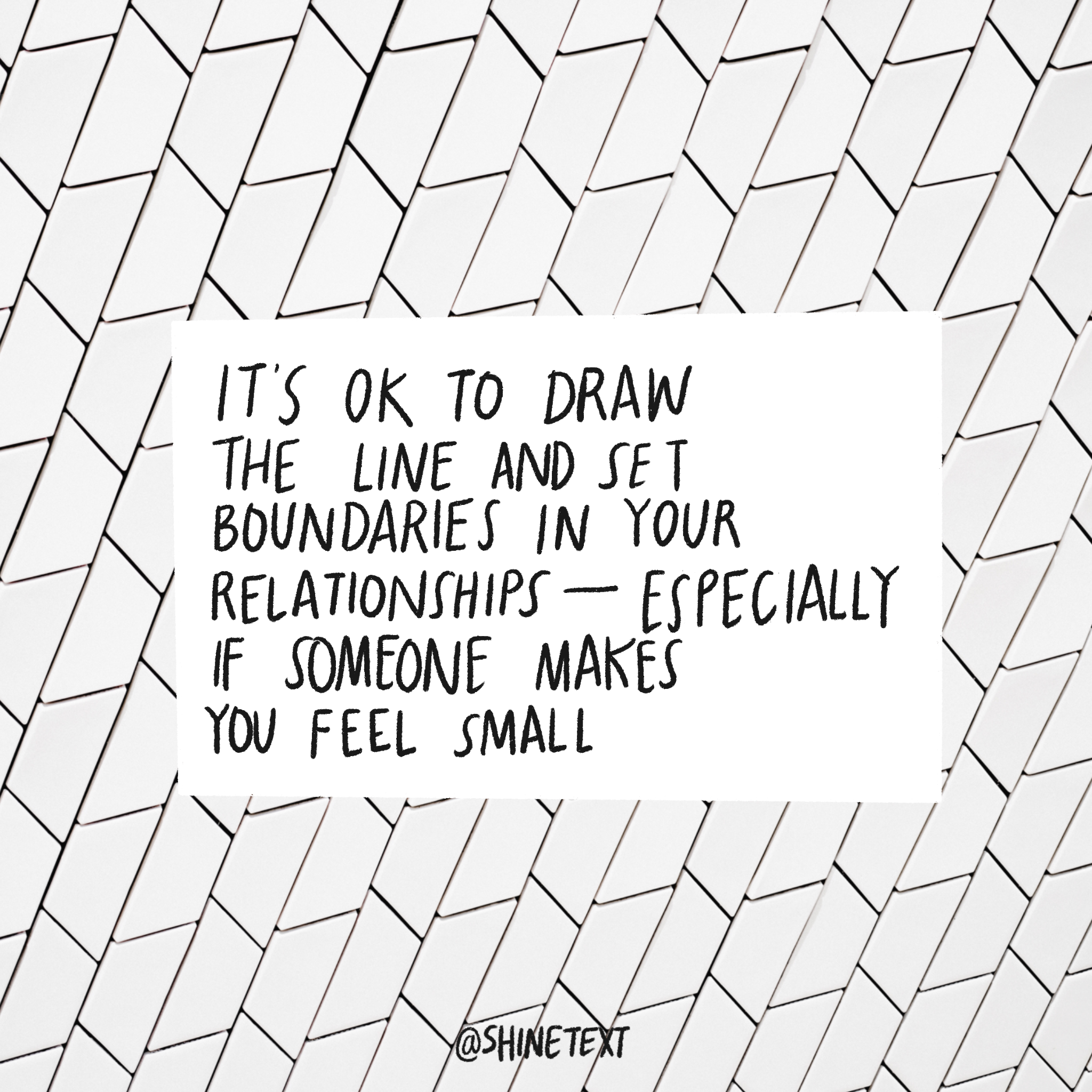Space Is Good: How to Create Boundaries in Defined Spaces
I need some space.
These might be the most terrifying words in the world to hear—or to say. But space is important! Space can keep you sane. And space is created by shifting your own personal boundaries, according to your own needs. Don’t worry, it can be done—and doesn’t take a scary talk to get there.
Relationships can often seem black and white, whether it comes to romance, friendship, work, or family. But in reality, each relationship you have has a pre-defined boundary that can actually ebb and flow when you need it to.
Each relationship you have has a pre-defined boundary that can actually ebb and flow when you need it to.
When we need to protect ourselves, we can actually take as much space as we want. I learned this firsthand.
A few years ago, I felt overwhelmed by work, social obligations, running errands, whatever—all that life stuff. I had to make a conscious decision to stop saying yes to social activities and friendships that I knew would leave me drained. Was it fun to say no to Friday night drinks and summer Sundays at the pool? Not exactly! But did it protect my energy level in the long run? Absolutely.
Later, my boundaries shifted again, and I truly wanted to meet friends-of-friends for coffee and plan weekend day trips. But it was a top-down decision: I knew what I needed during that time in my life, and chose to make that clear to the people around me. And here’s the thing: Everyone (at least most people) understand. They’d probably like to reset their own boundaries, too.
There’s a tendency to want to be “available” to each other at all times—but we’re not emergency room doctors (at least most of us aren’t). There’s no need to constantly be “on call.”
There’s a tendency to want to be 'available' to each other at all times—but we’re not emergency room doctors (at least most of us aren’t). There’s no need to constantly be 'on call.'
And creating boundaries is actually one of the best ways to build and maintain strong relationships.
“Finding boundaries that are strong enough to protect us but flexible enough to allow us healthy connections to others is key to psychological and emotional health,” writes F. Diane Barth L.C.S.W.
Here’s how to create new boundaries, even in the face of previous expectations.
Your Work Boundaries
Maybe you’re bogged down with too much work, or having problems with a toxic co-worker. You can shift your boundaries in a few ways:
●︎ Change your environment. If you’re feeling distracted or unproductive, try simply moving to a new location—maybe you can take your laptop to a conference room, or even ask to switch seats altogether. If something’s bugging you, you don’t have to live with it.
●︎ Schedule a meeting. If the issue is more about your coworkers or an influx of work, try talking to your manager. Plot out in advance the problem you want to discuss, and most importantly, enter with a set of solutions.
Your Friendship Boundaries
Friendships shift like the tide and usually come in phases. Sometimes you can be incredibly close with someone, and then poof! The friendship disappears. It’s not uncommon. But what happens when all you want is a little more space?
●︎ Plan regular get-togethers. But Kara, you’re saying, I want more space! Not more hang-outs. Hear me out: Making a specific time to see a movie, grab coffee, or even sending a text once a week can help maintain the friendship, but prevent any boundary-stepping or encroachments like a sudden text barrage or hearing the line, “But we never hang out.”
Making a specific time to see a movie, grab coffee, or even sending a text once a week can help maintain the friendship, but prevent any boundary-stepping or encroachments.
●︎ Have a talk. This is incredibly delicate and could go nuclear, so choose your words carefully. Saying something like, “Hey, I’m sorry to have been so off the radar lately, it’s just that (all the reasons your life has gotten busy) and lately I haven’t been able to devote as much time to my friendships. I’m hoping things change down the road, but just wanted to lay things out so you understand I’m not trying to ghost you!” And that’s another important point: Don’t actually ghost your friends.
Being honest upfront will make you both feel better if the friendship takes a little break. Communication, as in all relationships, is key.
Your Relationship Boundaries
Maybe you’re an introvert but your partner is a partygoer. Don’t fret! Your relationship can still work—so long as you’re clear about your needs.
●︎ Make plans you’re excited about. If you feel forced into doing something you don’t want to do, it’s easy to become resentful. So monitor your feelings from the get-go—if this event was happening today, would you feel like going? Do you actually feel like skipping the latest Jurassic World and streaming The Handmaid’s Tale (again)? Tell them! Having enthusiasm when you do spend time together is important.
●︎ Communicate when you need “me” time. Especially in new relationships, it’s easy to be surprised by someone else’s habits. Maybe they’re super chatty but you do your best thinking in a quiet environment. That’s totally OK—and it’s OK to bring up, too. Even stating something simple like, “I’m going to read for a bit, if that’s cool?” can subtly set boundaries without saying “I hate you and we should break up.” Plus, it’ll make you proud to be clear with your needs.
Your Family Boundaries
Much of the advice that works in your other relationships also works when it comes to your parents or siblings.
●︎ Create a routine. Calling every Sunday night or texting every other day (or whatever you wish) can help you establish your own boundaries, and help you avoid getting caught up in your family’s shifting needs.
●︎ Become future-obsessed. You can avoid the whole “but we never see you!” refrain if you plan ahead. (A lot of boundary-setting is really just planning for the future.) If you’re visiting family, have your next stop-over already planned so you can both have something to look forward to.
●︎ Know what is best for you. If you don't have a great relationship with your family, you might need to be mor necese rigid with your boundaries in order to protect yourself. If your family is creating stress that seeps into your life at work or at home, consider how you can lessen the impact. Or, if necessary, cut ties. Yes, they're family—but even families can be toxic.
A lot of boundary-setting is really just planning for the future.
And if all these ideas fail, you can fall back on the tried-and-true statement: “I’m sorry, but I can’t do that right now.” Things can’t get much more clear than that—and you might be surprised how much people appreciate your honesty.
Read next: Got Some Free Time? Here's How to (Actually) Unwind)

Shine is supported by members like you. When you buy through links on our site, we may earn an affiliate commission. See our affiliate disclosure for more info.


